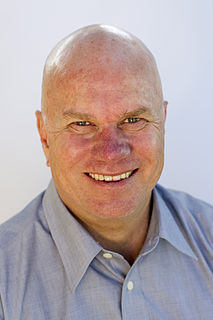Top 104 Meritocracy Quotes & Sayings - Page 2
Explore popular Meritocracy quotes.
Last updated on April 21, 2025.
It seems to me that obliviousness about white advantage, like obliviousness about male advantage, is kept strongly inculturated in the United States so as to maintain the myth of meritocracy, the myth that democratic choice is equally available to all. Keeping most people unaware that freedom of confident action is there for just a small number of people props up those in power and serves to keep power in the hands of the same groups that have most of it already.
Anarchism is opposed to states, armies, slavery, the wages system, the landlord system, prisons, monopoly capitalism, oligopoly capitalism, state capitalism, bureaucracy, meritocracy, theocracy, revolutionary governments, patriarchy, matriarchy, monarchy, oligarchy, protection rackets, intimidation by gangsters, and every other kind of coercive institution. In other words, anarchism opposes government in all its forms.
A meritocracy is a system in which the people who are the luckiest in their health and genetic endowment; luckiest in terms of family support, encouragement and, probably, income; luckiest in their educational and career opportunities; and luckiest in so many other ways difficult to enumerate - these are the folks who reap the largest rewards.
While Labour Party orators readily remember the 1980s for Conservative Prime Minister Margaret Thatcher's free-booting variety of entrepreneurial meritocracy, what gets forgotten is that Thatcher also gave the heave-ho to the old establishment's notion of merit - good breeding, a posh school, and so on.
I don't think actually that kind of ego check or "I could do better" mentality probably serves better in Hollywood, because it's definitely not a meritocracy. You can look at any number of careers and sort of see that they don't really make sense if it was only based on your movies working either creatively or financially. There are people that move ahead without that, and there are people that don't move ahead even if they did have that.
The dissonance that I felt daily flew in the face of what Silicon Valley says about itself: that it is a meritocracy, that it values intelligence and creativity, that everyone has a fair shot if they just work hard enough. This was true only if you were technical, and even that may not always be enough: in the age of the social network, who you know and who your friends were was becoming increasingly important.
For me white privilege has turned out to be an elusive and fugitive subject. The pressure to avoid it is great, for in facing it I must give up the myth of meritocracy. If these things are true, this is not such a free country; one's life is not what one makes it; many doors open for certain people through no virtues of their own.
I think you are looking at sexuality and not attributes, and I think it's odd because the conservative mantra is a meritocracy. And I think what you're suggesting is the fact that being gay parents makes you not as good as others. And I would suggest that a loving, gay family with a financially secure background beats the hell out of Britney Spears and Kevin Federline any day of the week.
What is different in capitalist civilization has been two things. First, the process of meritocracy has been proclaimed as an official virtue instead of being merely a de facto reality. The culture has been different. And secondly, the percentage of the world's population for whom such ascent was possible has gone up. But even though it has grown up, meritocratic ascent remains very much the attribute of a minority.
In order to get past disagreements, you just can't have one person with power decide. In other words, so just because I'm a boss, it would be terrible if I then said, "Okay, we're gonna go do this." That's why, after that thoughtful disagreement, there has to be a process of an idea meritocracy. That means okay, now you have to vote, not that the decision resides with power. And then you vote and move beyond it.
To have an idea meritocracy, one needs to do three things. First, they have to put their honest thoughts on the table, for everyone to look at and everyone to work through. Second, they need to have thoughtful disagreement, by which there are quality exchanges, in which there's open mindedness and the realization that no one has all the right answers. And you can work through that and get to better answers because good collective decision making is better than any individual decision making. And third, you have to have ways of getting past the disagreements if they remain.
For me upward social mobility is possible through talent and hard work and is a glowing endorsement of the benefits of living in a modern capitalist society. It's not so much evidence of a meritocracy, as evidence of healthy nepotism. Nepotism is at the core of a good group dynamic. A good group dynamic is at the core of rock'n'roll.
You have the Republican Party, who see themselves in their heart of hearts as being a party of colorblind meritocracy. That's their great belief about themselves. And yet somehow you also have a party where a lot of racial resentment and a camp of even neo-Nazis have set up camp in their party. If you point it out to them, they get mad at you, not at the neo-Nazis.
Enforcing equality to compensate for the monstrous unfairness of nature destroys liberty.
But total liberty leads to various forms of "aristocracy" and decay.
Yet total equality leads to oppressive statism and decay.
However, equality of opportunity leads to a vibrantly chaotic and creative meritocracy.
Radical transparency is critical to having an idea meritocracy because it shows what's actually happening without spin and prevents people from maneuvering politically behind each others' backs. It brings problems and weaknesses to the surface and allows people to see how they are dealt with, so it's great for training people on how to deal with real problems.
And look, we have young people in this country who are thirty years old living with their parents. We have young people in this country who don't have jobs, who graduate from college and are fed the lie of meritocracy. "You get a degree, you get a job." That's not happening. We have young people who have become the Zero Generation: zero hope, zero employment, zero possibilities. Do we really believe that this young generation is going to stand by and not take note of an economic system that - however it calls itself - has completely betrayed them?



































